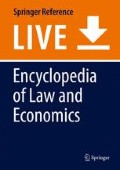Abstract
Must the rule of law spring upon us solely by accident and force, or can it also emerge as a product of political reflection and choice? As the lessons from the political and economic transition of centrally planned economies in Europe and Asia illustrate, the transitional movement requires an element of political reflection and deliberate choice, specifically the establishment a binding and credible commitment to limits on state action. In order to do so, credible commitment to the rule of law must be signaled exante by political reformers if reform efforts are to be successful, from which economic development follows expost. The historical record shows, however, that efforts to establish the rule of law in transition economies have been mixed. This chapter explains why this is the case, specifically by comparing Russia and China as case studies of transitional political economy.
References
Acemoglu D (2003) Why not a political coase theorem? Social conflict, commitment, and politics. J Comp Econ 31:620–652
Acemoglu D, Johnson S (2005) Unbundling institutions. J Polit Econ 113(5):949–995
Blanchard O, Shleifer A (2001) Federalism with and without political centralization: China versus Russia. IMF Staff Pap 48:171–179
Boettke PJ (1993) Why perestroika failed: the politics and economics of socialist transformation. Routledge, New York
Boettke PJ (1995/2001) Credibility, commitment and soviet economic reform. In: Boettke PJ (ed) Calculation and coordination: essays on socialism and transitional political economy. Routledge, New York, pp 154–175
Boettke PJ (1999) The Russian crisis: perils and prospects for post-soviet transition. Am J Econ Sociol 58(3):371–384
Boettke PJ (2009) Institutional transition and the problem of credible commitment. Annu Proc Wealth Well Being Nation 1:41–52
Buchanan JM (1997) Post-socialist political economy: selected essays. Edward Elgar, Lyme
Cheung SNS (1982/1986) Will China go ‘Capitalist’?: an economic analysis of property rights and institutional change, 2nd edn. Institute of Economic Affairs, London
Coase R (1960) The problem of social cost. J Law Econ 3:1–44
Coase R (1992) The institutional structure of production. Am Econ Rev 82(4):713–719
Coase R, Wang N (2012) How China became capitalist. Palgrave Macmillan, New York
Coyne CJ, Leeson PT (2004) The plight of underdeveloped countries. Cato J 24(3):235–249
Friedman M (1962/2002) Capitalism and freedom, 40th anniversary edition. University of Chicago Press, Chicago
Friedman M (2002) Preface: economic freedom behind the scenes. In: Gwartney J, Lawson R (eds) Economic freedom of the world 2002 annual report. The Fraser Institute, Vancouver
Furubotn EG, Pejovich S (1972) Property rights and economic theory: a survey of recent literature. J Econ Lit 10(4):1137–1162
Hayek FA (1973) Law, legislation and liberty, Vol. 1: Rules and order. University of Chicago Press, Chicago
Leeson PT, Boettke PJ (2009) Two-tiered entrepreneurship and economic development. Int Rev Law Econ 29(3):252–259
Leeson PT, Trumbull WN (2006) Comparing apples: Normalcy, Russia, and the remaining post-socialist world. Post-Soviet Aff 22(3):225–248
Li DD, Feng J, Jiang H (2006) Institutional entrepreneurs. Am Econ Rev 96(2):358–362
Montinola G, Qian Y, Weingast BR (1995) Federalism, Chinese style: the political basis for economic success in China. World Polit 48(1):50–81
Murphy KM, Shleifer A, Vishny RW (1991) The allocation of talent: implications for growth. Q J Econ 106(2):503–530
Pejovich S (2003) Understanding the transaction costs of transition: it’s the culture, stupid. Rev Aust Econ 16(4):347–361
Qian Y, Weingast BR (1997) Federalism as a commitment to perserving market incentives. J Econ Perspect 11(4):83–92
Rodrik D (1989) Promises, promises: credible policy reform via signaling. Econ J 99(397):756–772
Selgin G, White LH (2005) Credible currency: a constitutional perspective. Constit Polit Econ 16(1):71–83
Shleifer A (1997) Schumpeter lecture: government in transition. Eur Econ Rev 41:385–410
Stigler GJ (1966) The theory of price, 3rd Ed. New York: Macmillan
Storr VH (2013) Understanding the culture of markets. Routledge, New York
The World Bank (2017) World development indicators. World Bank Group, Washington, DC. https://openknowledge.worldbank.org/bitstream/handle/10986/26447/WDI-2017-web.pdf?sequence=1&isAllowed=y
Tullock G (1967) The welfare costs of tariffs, monopolies, and theft. West Econ J 5(3):224–232
Tullock G (1975) The transitional gains trap. Bell J Econ 6(2):671–678
Wagner RE (2016) Politics as a peculiar business: insights from a theory of entangled political economy. Edward Elgar, Northampton
Wagner RE, Runst P (2011) Choice, emergence, and constitutional process: a framework for positive analysis. J Inst Econ 7(1):131–145
Wagner RE, Yokoyama A (2013) Polycentrism, federalism, and liberty: a comparative systems perspective. J Public Finance Public Choice 31:179–197
Weingast BR (1995) The economic role of political institutions: market-preserving federalism and economic development. J Law Econ Org 11(1):1–31
White LH (2010) The rule of law or the rule of central bankers? Cato J 30(3):451–463
Author information
Authors and Affiliations
Corresponding author
Editor information
Editors and Affiliations
Rights and permissions
Copyright information
© 2018 Springer Science+Business Media LLC
About this entry
Cite this entry
Candela, R.A., Piano, E. (2018). Transition Economies: Rule of Law and Credible Commitment. In: Marciano, A., Ramello, G. (eds) Encyclopedia of Law and Economics. Springer, New York, NY. https://doi.org/10.1007/978-1-4614-7883-6_735-1
Download citation
DOI: https://doi.org/10.1007/978-1-4614-7883-6_735-1
Received:
Accepted:
Published:
Publisher Name: Springer, New York, NY
Print ISBN: 978-1-4614-7883-6
Online ISBN: 978-1-4614-7883-6
eBook Packages: Springer Reference Economics and FinanceReference Module Humanities and Social SciencesReference Module Business, Economics and Social Sciences

